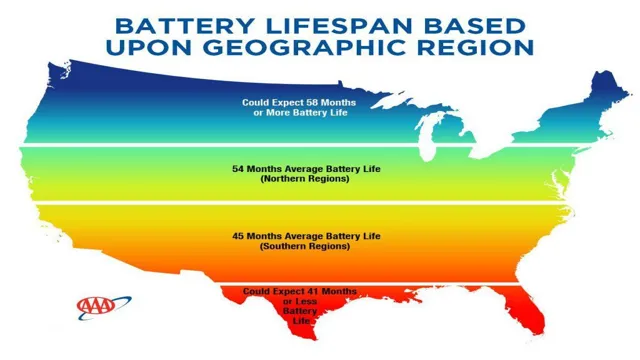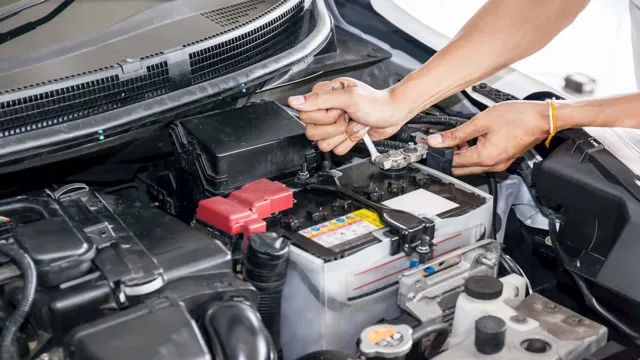The Shocking Truth About Electric Car Battery Life: Debunking the Average Myths
As we continue to push forward towards a more environmentally friendly future, the electric car has become an increasingly popular mode of transportation. With their impressive speed, sleek designs, and zero emissions, these vehicles offer a fantastic alternative to traditional gas-guzzling cars. However, one issue that many potential buyers have is the question of electric car battery life.
Will it last as long as a traditional car battery? What factors can affect its lifespan? And is it really worth the investment? In this blog, we’ll dive into the world of electric car batteries and provide you with all the information you need to make an informed decision. So buckle up and let’s get started!
Overview of Electric Car Batteries
When it comes to electric cars, one of the key factors people consider before investing in this eco-friendly vehicle is the battery life. How long will the battery last before needing to be replaced? While it’s difficult to give an exact answer, the average battery life of an electric car is around 8-10 years, or roughly 100,000 miles. That being said, it’s important to note that the lifespan of an electric car battery can vary depending on a number of factors.
For example, extreme weather conditions such as extreme heat or cold can affect the battery’s performance and lifespan. Similarly, driving style, frequency of charging, and even the type of charger used can all impact how long an electric car’s battery lasts. Despite these variables, car manufacturers are continuously working on improving battery technology to increase their lifespan and improve the overall driving experience for electric car owners.
Different Types of Electric Car Batteries
Electric car batteries are the heart of electric vehicles, providing power to keep them running smoothly. There are different types of electric car batteries available, each with its own pros and cons. Lithium-ion batteries are the most common type used in electric vehicles due to their high energy density, which allows them to store more energy per unit of weight.
Nickel-metal hydride batteries are another type of battery, which are less expensive than lithium-ion batteries but have a lower energy density. Solid-state batteries are emerging as a potential alternative to lithium-ion batteries, promising longer range and faster charging times. However, they are not yet widely available and production costs are still high.
When choosing an electric car, the type of battery used is an important consideration as it can impact the range, performance, and cost of the vehicle.

Factors Affecting Electric Car Battery Life
Electric Car Battery Life Electric cars are becoming increasingly popular due to their low carbon emissions and cost-efficient maintenance. However, the lifespan of an electric car battery is a cause for concern among consumers. The battery’s longevity is affected by various factors, including the type of battery, usage patterns, and environmental conditions.
Lithium-ion batteries are commonly used in electric cars due to their high energy density and durability, but they can degrade over time if not properly maintained. Frequent fast charging and deep discharging can also shorten the battery’s lifespan. Extreme temperatures, particularly high heat, can cause thermal degradation, thus reducing the battery’s capacity.
On the other hand, cold temperatures can increase the battery’s internal resistance, reducing its output and overall performance. Therefore, it is essential to maintain and store electric car batteries under optimal conditions to ensure a longer lifespan and better performance.
Average Electric Car Battery Life
The average battery life of an electric car is a concern for many potential buyers, and it’s a question that is difficult to answer definitively. It depends on a variety of factors such as the make and model of the car, the size of the battery, and how the car is driven. Generally speaking, most electric car batteries are built to last for at least 100,000 miles, and some can last even longer.
However, it’s important to remember that the life of a battery can be affected by how often it is charged and how it is used. For example, if an electric car is driven in extreme weather conditions or is frequently fast-charged, the battery may not last as long. Additionally, some electric car batteries may start to lose capacity over time, which can decrease the car’s range.
Ultimately, the average battery life of an electric car is a complex issue that requires careful consideration before making a purchase.
Data on Average Battery Life of Different Electric Car Models
Electric car battery life When considering purchasing an electric car, one of the most important factors to consider is the battery life. The average battery life of electric cars varies depending on the make and model, but it’s important to note that battery technology is constantly improving, and many newer models have longer-lasting batteries. According to recent data, the average battery life of electric cars is around eight to ten years or about 100,000 miles.
However, some electric car models have batteries that can last for up to 200,000 miles or more. It’s important to note that factors like driving habits, temperature, and charging habits can also impact the battery life of electric cars. Overall, it’s essential to do your research and choose an electric car with a reliable battery that meets your needs.
Factors Affecting Average Electric Car Battery Life
The average battery life of an electric car is a crucial factor when it comes to owning one. There are various aspects to consider that can affect the lifespan of the battery. For example, temperature fluctuations can be a significant influence on how long your battery lasts.
Extreme temperatures can impact battery performance, and in some cases, result in permanent damage. Another aspect to consider is the age of your vehicle. As electric vehicles continue to advance, it is essential to keep in mind that newer models may have a more extended battery life and better technology.
Moreover, how you drive your electric car has an impact on the battery life. Driving at high speeds or acceleration can drastically reduce your battery life. Furthermore, driving on rough roads or carrying heavy loads adds extra stress on the battery, which can lead to a shorter lifespan.
In summary, the average battery life of an electric car depends on various factors such as temperature, age, driving habits and usage, and proper maintenance. Therefore, it is essential to consider these factors when buying and owning an electric car.
Comparison with Traditional Gasoline Cars
When it comes to comparing electric cars with traditional gasoline cars, one of the most significant factors to consider is battery life. The average lifespan of an electric car battery can vary, but most manufacturers estimate that their batteries last for around 100,000 miles. This is in stark contrast to a gasoline car, which can last upwards of 200,000 miles with proper maintenance.
However, it’s important to note that electric cars don’t require the same level of maintenance as traditional cars, and the cost of replacing an electric car battery is much lower than a traditional car engine. Additionally, many electric car batteries are rechargeable and can be recycled at the end of their life, reducing their environmental impact. So, while the average electric car battery life may be shorter than a gasoline car engine, the overall cost and environmental benefits make them a smart choice for many drivers.
Ways to Improve Electric Car Battery Life
The average battery life of an electric car is a concern for many drivers. However, there are ways to increase the lifespan of your electric car’s battery. One way is to keep your battery charged between 20% and 80% rather than fully charging or depleting it.
This can help prevent overcharging and undercharging, which can damage the battery cells. Another tip is to avoid leaving your electric car parked in extreme temperatures, such as in direct sunlight or freezing temperatures. Similarly, avoid driving your electric car aggressively or accelerating rapidly when possible as it puts more strain on the battery.
Regular maintenance is also key to ensuring optimal battery performance, such as keeping your tires properly inflated and brakes optimized. By taking these steps, you can increase the average battery life of your electric car and enjoy a more sustainable mode of transportation.
Best Practices for Extending Electric Car Battery Life
Electric Car Battery Life Electric cars have shown to be an eco-conscious solution to the increasing vehicle emissions. However, electric car battery life is a common concern for many owners. Battery degradation occurs over time, and its capacity to hold a charge reduces.
So what can be done to improve electric car battery life? Firstly, charging the battery to 80% instead of 100% can increase its lifespan. Also, avoid quick charging frequently as it has detrimental effects on your battery’s longevity. Temperature plays a crucial role, significantly impacting the battery’s performance.
Extreme temperatures should be avoided, such as leaving the car in the sun or exposed to freezing weather. Finally, regular maintenance of the battery system should be undertaken to ensure its efficiency lasts longer. Simple checks like keeping the battery free from debris or in a well-ventilated area can go a long way.
By following these best practices, you can expect a much longer lifespan of your electric car battery.
Advancements in Battery Technology
If you’re considering buying an electric car, one of the primary concerns you might have is battery life. After all, you don’t want to be stranded on the side of the road with a dead battery. Fortunately, advancements in battery technology mean that electric car batteries are becoming more efficient and longer-lasting than ever before.
One way that manufacturers are improving electric car battery life is by using different materials in the battery cells. For example, some companies are experimenting with nickel, cobalt, and manganese to create more energy-dense batteries that can store more power in a smaller space. They’re also working on improving the thermal management systems in electric cars to keep the batteries at a more consistent temperature, which can help extend their lifespan.
And finally, researchers are investigating new types of batteries, such as solid-state batteries, that could potentially offer even better performance than lithium-ion batteries. So while there’s still a way to go, the future looks bright for electric car batteries.
Conclusion: Is Electric Car Battery Life Enough?
In the world of electric cars, battery life is a hot topic that leaves many scratching their heads. While some may bemoan the average battery life of an electric car, it’s important to remember that this is still a burgeoning industry. As technology continues to evolve and improve, so too will the lifespan of electric car batteries.
So, while we may not have all the answers today, we can look forward to a bright and more sustainable future on the horizon.”
FAQs
How long does the battery last on average for an electric car?
The average battery life of an electric car is around 100,000 miles or 8 years.
Can the battery life of an electric car be extended?
Yes, regular maintenance and proper charging habits can help extend the battery life of an electric car.
Do electric car batteries degrade over time?
Yes, like all batteries, the capacity of an electric car battery degrades over time, but the rate of degradation varies depending on usage and other factors.
How does the range of an electric car relate to its battery life?
The range of an electric car depends on the capacity and efficiency of its battery, so a longer battery life can result in a longer driving range between charges.




